
views
Exemption & Documentation Requirements

Read your jury notice. Your jury notice or summons will contain information about when you’ve been called to jury duty as well as the steps to take to seek an exemption. Some commonly accepted exemptions may be listed on the summons, as well as what documentation the court requires to prove the exemption applies to you. Carefully note any dates on your summons, including the dates you’ve been called to jury duty. You will have to include these dates in your jury excuse letter and may need to provide them to anyone whom you need to write a letter on your behalf as documentation. For example, if you cannot appear for work-related reasons, you may need a letter from your boss that tells the court why you cannot be spared from work on those days.
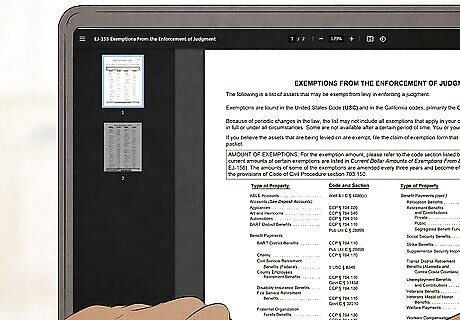
Check the court’s rules for exemptions. Write down the rule number or statute number of any exemptions that fit your situation. There may be some general rules in state and federal law, but each court also has its own rules regarding the types of people who are generally exempt from jury duty. In addition to those listed on your summons, check the court website or call the clerk’s office to learn any other common exemptions. Here are some common reasons to be exempt from court: Being employed as a public official, police officer, or firefighter (for federal court) Serving active duty in the armed forces Being over the age of 70 or 80 Having medical issues or disabilities Employment conflict or financial hardship Being a breastfeeding mother or having active care and custody of young children, elderly, or disabled family members Being a full-time high school or college student Some excuses allow you to be excused from jury duty, while others only allow you to have your service deferred for a specific time. Make sure you know whether you're eligible for a complete excuse or a deferral so you ask for the right thing. Many states, like Massachusetts, have strict legal requirements regarding disqualification from jury duty for medical reasons. If you plan on claiming a medical excuse, read these requirements carefully and talk to your doctor before writing your letter. Many of these exemptions apply to jury duty in both the United States and the UK.
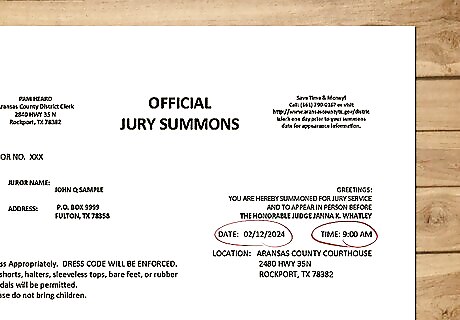
Make note of any deadlines. Your jury notice may include a date by which you must respond if you want to request an exemption. Keep in mind that if you don’t meet this deadline, you typically won’t be excused from jury duty unless you have an emergency situation that requires your presence elsewhere. For example, the state of Texas allows you to postpone jury service at least once, but you must send a letter with your reasons for being excused at least two weeks before the date you’re scheduled to serve. In the UK, you must respond to the summons within 7 days of receiving it or risk being fined up to £1,000. Contact the Jury Central Summoning Bureau for any questions.

Gather necessary documentation. You may have to provide documentation of the reason you want to be excused from jury duty. For example, if you have a medical condition, you may need a note from your doctor in addition to your letter. Plan in advance to get the documentation you’ll need. If you’re asking to be excused from jury duty because it would present financial hardship, gather documents that prove the state of your finances or the fact that your income is necessary to care for dependents. If you’re claiming a work-related reason, talk to your supervisor or manager about writing a letter for you to include with your own letter describing the need for you to be at work on the dates you’ve been summoned. You may also need to provide similar documentation as proof in the UK.
Drafting Your Jury Excuse Letter
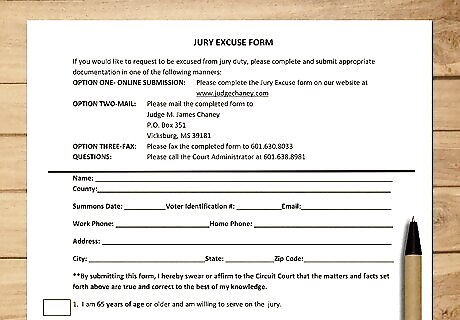
Search for any court-provided forms. Some courts have a form they prefer you to use rather than simply writing a letter. If the court to which you’ve been summoned has a particular exemption form, it will typically be included in the envelope with your summons. You may also be able to call the clerk’s office to find out if a certain form needs to be used. For example, if you are summoned to serve on a jury in New Jersey, the court includes a questionnaire that you must complete and return. On that questionnaire, you can indicate if you are not qualified to serve on a jury or if you want your service dates to be postponed. In some jurisdictions, these forms must be completed and sent within a certain period of time after you receive your summons, regardless of whether you are asking to be excused from service. In the UK, you can either respond to your summons online at gov.uk, or complete and return the form by mail.
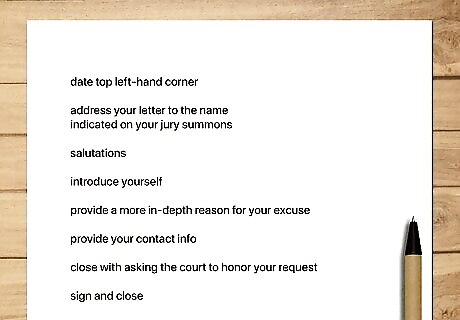
Format your letter as a business letter. If no form is available, type your letter using the business-letter format. Date your letter with the date you intend to mail it and include both your mailing address and the mailing address of the court. You may also include other contact information such as your phone number or email address.
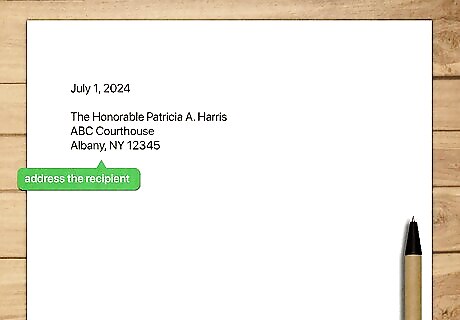
Address the letter to the name indicated on your summons. This may be the clerk of court or a specific judge. This name or title should also be included in your salutation. Do not abbreviate titles or change the person’s name in any way. For a judge, the proper salutation should be “Dear Honorable Judge (Full Name)”. For example, Dear Honorable Judge Katherine Smith. Use the full name as provided for the clerk.
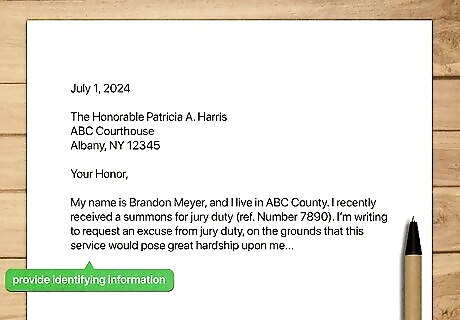
State your name, juror number, court date, and address. Begin your letter by providing your full legal name and any identifying information included on your jury notice. If your summons includes a jury number or other reference number, include that in your introduction as well as the subject line of your letter. Be sure to list your court date and mailing address, as well. For example, write something like “My name is Jane Doe. On (date), I received a jury summons for (court date) at (court address) and was assigned the juror number (insert number here). I am writing to request to be excused from jury service because being absent from work would pose an extreme financial hardship.”
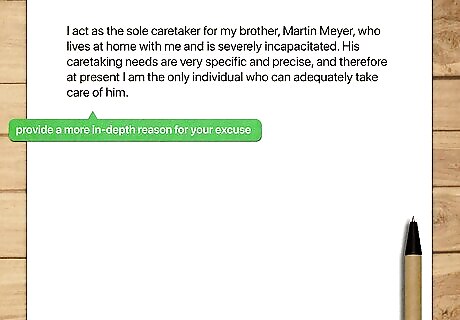
Explain the reason for your request. Provide a brief explanation of why you believe you should be excused from jury duty, sticking to the facts of your situation. Be sure to thoroughly explain your situation and relate it to one of the excuses your court typically accepts. If the court accepts work-related excuses, explain the necessity for you to be at work or the hardship that would occur if you were to miss work. For example, you may work at a small business that would have to close for the day if you weren't there to run the shop. You could say something like “I currently run a small business as the sole employee. If I were to serve on the jury, I would have to close my shop, which would drastically affect my income. My household consists of (number of residents) and our monthly income is (total income), of which (individual income) is from my business. Our monthly expenses average (total expenses).” If you're requesting to be excused from jury duty because you must care for a child, consider including reasons you are unable to find appropriate child care under the circumstances. Keep in mind that, in some jurisdictions, you are limited to one reason for your excuse. For example, in California, your excuse is denied if you indicate more than one reason why you are disqualified from jury service. For this reason, rather than piling on multiple reasons, pick the one for which you have the strongest documentation.
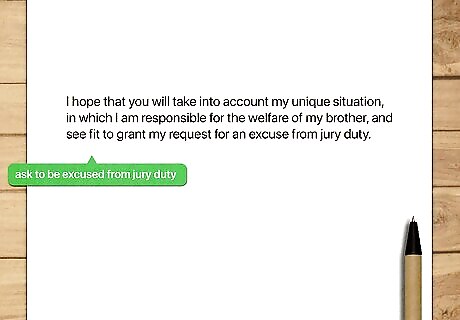
Ask to be excused from jury duty. Close your letter by telling the court you want to be excused because of your reason. Define whether you want to be permanently excused or simply have the duty deferred or postponed to a future time. Your request may have a greater chance of being approved if you are willing to serve at a different time. However, if this isn't possible, you should state so clearly. For example, many courts will excuse breastfeeding mothers from jury duty. In that case, you may be willing to serve if your duty is postponed until a date in the future when your child is no longer breastfeeding. Say something like “As I am a breastfeeding mother, I am more than willing to serve on the jury once my child is no longer breastfeeding. This should be in about 3 more months.” If you cannot serve at another time because of a permanent disability, for example, try something like “Because my disability is permanent and affects my ability to get around, I am requesting to be permanently excused from jury duty.” In the UK, you’ll need to suggest 3 possible dates in the next 12 months that you could serve on the jury. You may only be excused completely if you have a serious illness or disability, are the full-time caretaker of someone with a serious illness or disability, or if you are a new parent.
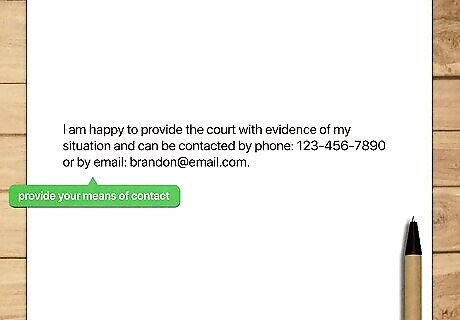
Indicate your preferred method of response. Unless the court specifically lists the way in which you will be notified of its decision, you can usually let the court know how you would prefer to be notified. For example, if you prefer a phone call rather than waiting for a written response, mention this at the closing of your letter and provide the phone number at which you wish to be contacted. Say something like “If possible, I’d prefer to receive a phone call when you reach your decision. You can contact me at (phone number). Thank you for your consideration.”
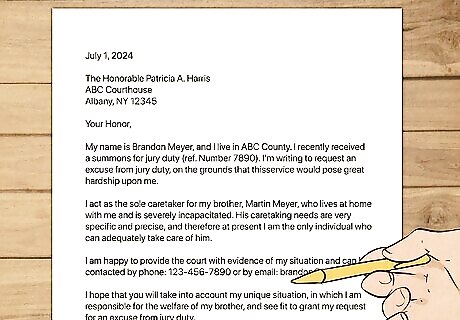
Proofread your letter. Make sure you read through your letter carefully before you print it to ensure there are no typographical or grammatical errors. Read slowly and don’t rely on spelling and grammar checkers. You want to be as professional as possible to increase your chances of having your excuse accepted. It may help to read your letter aloud or have someone else read over it to see if they can catch any typos you may have overlooked.
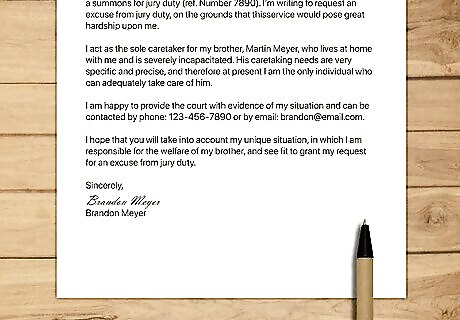
Type and sign your name. Leave a space for your signature and type your full name below it. You may also include your address, phone number, and other contact information. Then, print your letter and sign it with cursive writing in blue or black ink.
Submitting Your Jury Excuse Letter

Review your jury notice for instructions. Your notice should have an address listed for sending jury excuse letters. Make sure you send the letter to the correct court address or office so it is received and considered before the date you were summoned for jury duty.
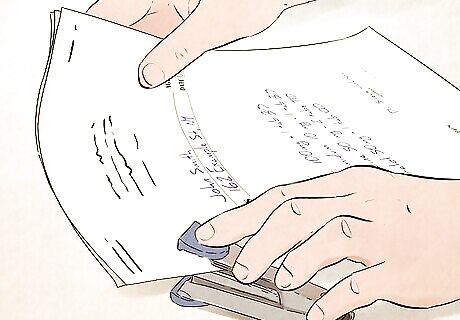
Attach any supporting documentation. If your excuse requires additional documentation, like a doctor’s note or a note from your employer, make sure they’re attached to your letter before mailing it. It won’t hurt to double- or triple-check that all the required documents are in the envelope. For example, if you will be out of town on the date you were summoned for jury duty, and you've already made reservations or purchased plane tickets, copies of these reservations and/or tickets would provide proof of your excuse.
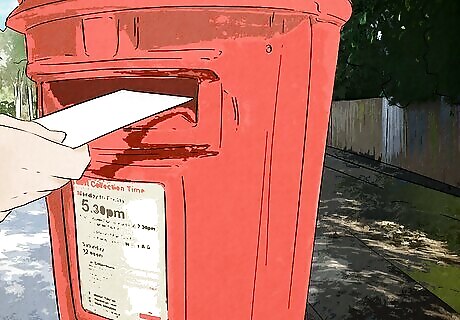
Mail your letter. Double-check the deadline before mailing the letter. The summons may state that your letter must be mailed by that day or it may say the court must receive it by that day. Consider using certified mail, return receipt requested, so you receive a notification when the court has received your letter. If you're unsure whether the court will receive your letter by the deadline if you use regular mail, use priority two-day or next-day mailing services. Make copies of everything you send to the court before you mail it, so you have them for your records.

Wait for a response. The court will consider your request and let you know in writing, usually within a couple of weeks, whether you are excused from jury duty. Check with your court to find out exactly when to expect your response. Keep in mind that courts typically consider each request on a case-by-case basis, and they have the discretion to grant or deny your request. Just because someone else has been excused from jury duty for the same reason you've provided doesn't mean your request to be excused will be granted.
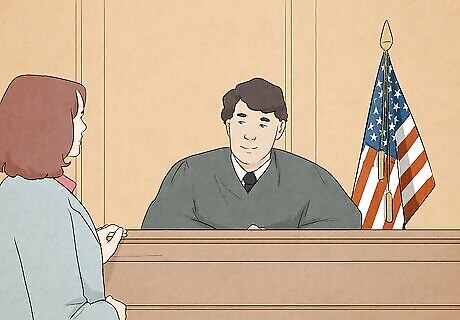
Appeal the decision if it's denied. If your exemption is denied, you’re expected to attend jury duty or you may be fined or held in contempt of the court. If you feel strongly that the court made the wrong decision, you have the right to appeal the decision to a judicial officer. Reach out to your court to determine how to do so. In the UK, you can appeal the decision by writing to the Jury Central Summoning Bureau. Include your full name, address, date of birth, and juror number. Note the name and address of the court you’ve been summoned to, as well as the dates of your jury service. Explain why you disagree with the decision and provide as much evidence as possible.



















Comments
0 comment